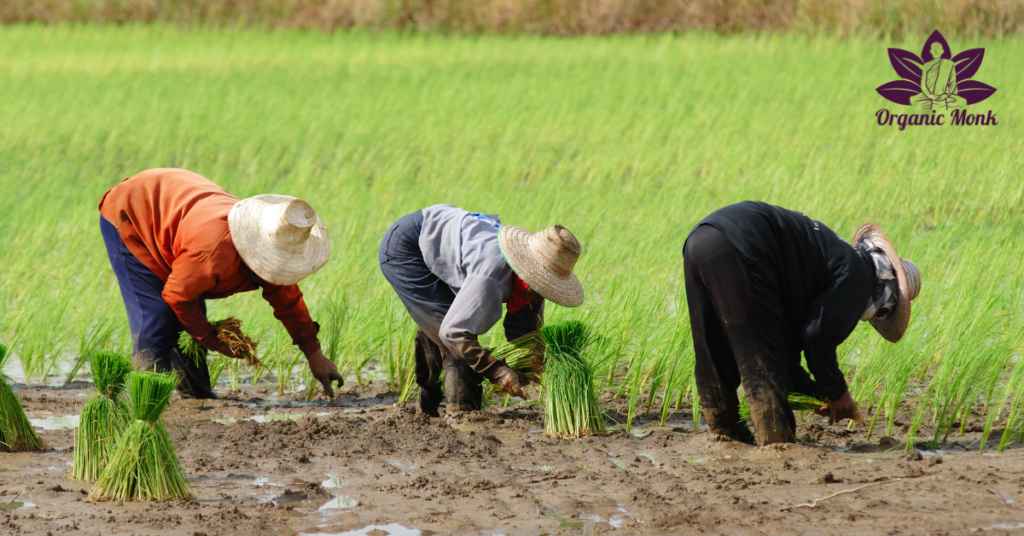Organic Farming Introduction
Organic farming appears as a ray of hope for a sustainable and fair food system. In a world confronting ever-increasing difficulties connected to climate change, environmental degradation, and social injustice. In addition to being good for the environment, organic farming is essential in addressing concerns about food justice. Since it is founded on principles that put an emphasis on ecological balance, biodiversity, and ethical practices. This blog digs into how organic farming and food justice are interwoven. It will examine how this agricultural strategy promotes social fairness, improves food security, and aids local communities.
1.2 Organic Agriculture: An Overview
The use of synthetic pesticides, genetically modified organisms (GMOs), and artificial fertilizers is prohibited in organic farming. Instead, it uses organic techniques to control pests and preserve soil, including crop rotation, composting, and integrated pest management (IPM). Organic farming is based on the idea that nature is a complex network of linked systems. And organic farming works in harmony with these systems produces more sustainable results.
1.3 Environmental Advantages of Organic Agriculture
Soil Health: Organic Agriculture farming techniques support soil fertility and structure by promoting the development of advantageous microorganisms. And preserves the amount of organic matter in the soil. As a result, there is greater water retention, less erosion, and increased drought and flood resistance.
Preservation of biodiversity: Organic farms often have greater biodiversity levels, providing habitat for a range of plants and wildlife. This variety supports ecological balance, essential for preserving a healthy environment and aids pollinators, pest predators, and pest control.
Water Quality: Organic farming contributes to preserving the water quality of adjacent rivers and aquifers by avoiding the use of artificial fertilizers and pesticides. This is crucial since polluted water sources can seriously harm aquatic life and human health.
Climate Change Mitigation: Organic farms often use fewer fossil fuels and can store carbon in healthy soils, which results in lower carbon footprints. Using energy-intensive inputs less frequently helps with the fight against climate change.
1.4 Food Justice and Its Important Elements
Food justice emphasizes the equitable allocation of resources and addresses the underlying causes of food insecurity and malnutrition. It goes beyond ensuring that everyone has access to enough food. The following are the main elements of food justice:
Access: Everyone should have fair access to fresh, wholesome, and culturally appropriate food, regardless of socioeconomic position or geography. Taking care of food deserts, when populations lack access to grocery shops with fresh produce, is part of this.
Equity: Food justice promotes equity in the food system by guaranteeing that marginalized groups and small-scale farmers have an equitable opportunity to participate in the food economy and are given assistance.
Sustainability: The food system ought to be ecologically friendly, with a focus on minimizing harm to ecosystems and subsequent generations.
Cultural Awareness: Stressing various culinary customs and promoting ethnically appropriate cuisine acknowledges the significance of food in defining cultural identity.
1.5 Link between Organic Farming and Food Justice
Local economies and small – scale farming: Because organic farming is frequently done on a smaller scale, it is more readily available to local communities and small-scale farmers. Organic farming increases community resilience and lessens dependency on international supply chains, promoting more food sovereignty while bolstering local economies. Farmers are empowered by organic farming because it lessens their reliance on pricey inputs, such as seeds and artificial fertilizers, which may put smallholder farmers in debt. Organic farming methods also encourage farmers to acquire the knowledge and abilities necessary to coexist with nature.
Social Inclusion and Fair Labor: Organic farms place a high value on fair labor practices, which include offering employees respect, safe working conditions, and competitive pay. This promotes social inclusion and safeguards marginalized groups that work in agriculture.
Indigenous knowledge preservation: Organic farming honors and includes indigenous knowledge and traditional agricultural methods, safeguarding cultural heritage and the expertise of earlier generations.
Climate Resilience: By encouraging sustainable agricultural practices that adjust to changing climatic circumstances, organic farming, with its emphasis on creating wholesome and biodiverse ecosystems, contributes to climate resilience.
Reduced Environmental Injustice: Conventional agriculture’s significant reliance on agrochemicals has a disproportionately negative impact on underprivileged neighborhoods located close to industrial farms, contributing to environmental injustice. By reducing these harmful externalities, switching to organic farming helps create a more equitable food system.
1.6 Conclusion
Organic farming and food justice go hand in hand, providing a route to a more just and sustainable food system. We can encourage environmental stewardship, advance social inclusion, and improve the livelihoods of small-scale farmers and marginalized communities by adopting organic agriculture. We must promote legislation that supports organic farming, makes investments in regional food economies, and puts the needs of the most vulnerable people first if we are to create a truly equitable and sustainable future. Adopting the ethics of organic farming and supporting food justice are moral requirements that will sustain future generations of people and the earth.

